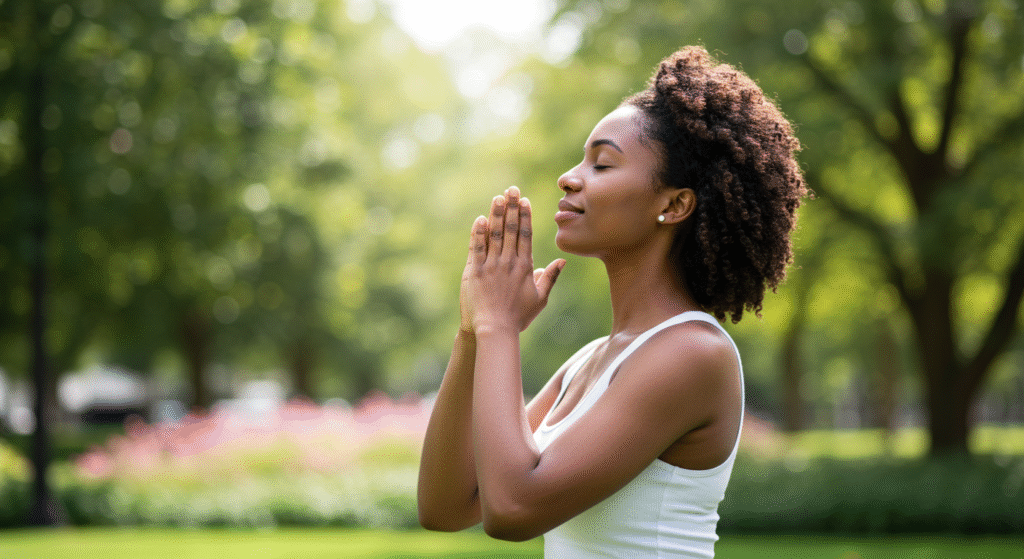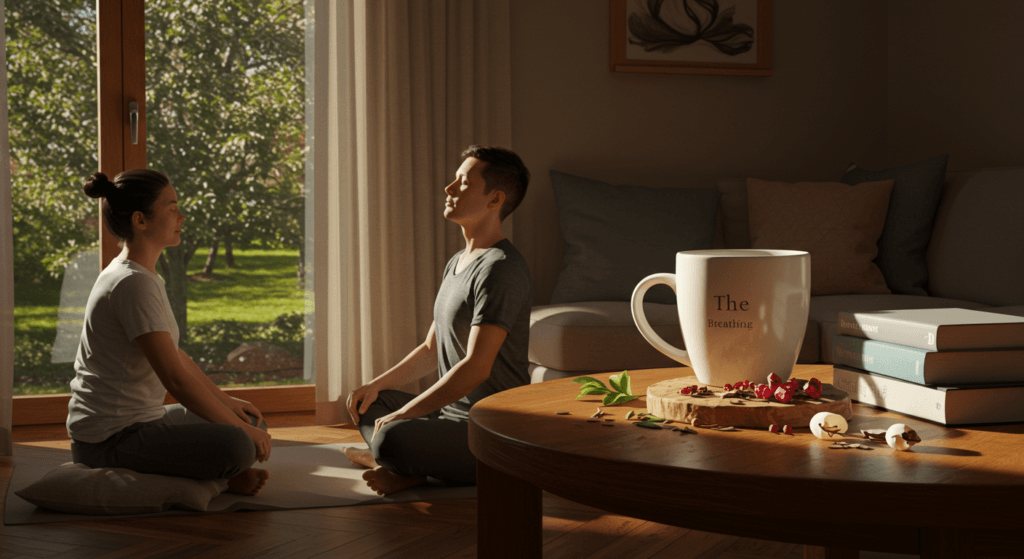
Ever wonder why some folks handle life’s curveballs like it’s no big deal, while others get totally knocked off course? Spoiler alert: it’s not about having superhero DNA—it’s usually about improving mental health naturally through practical, everyday habits.
Think about it: with 1 in 4 adults wrestling with mental health stuff yearly, keeping your mind right isn’t just a luxury—it’s survival mode.
But here’s the kicker: you don’t need bougie therapies or some 10-step life overhaul to level up your brain game. Turns out science keeps pointing us back to simple stuff that’s hiding in plain sight—like free, boring, actually doable habits that sharpen your mood and resilience.
Wanna hear the best part? These techniques aren’t mystical secrets – they’re grounded in solid science. We’re talking zero-cost, couch-friendly strategies to stress less, bounce back faster, and—plot twist—even enjoy the ride. No therapy couch or PhD required. Mic drop.
Why Taking Care of Mental Health Matters More Than Ever
Let’s cut to the chase—life isn’t getting simpler, folks. Between hustle culture, Instagram-perfection pressure cookers, and the world’s never-ending chaos, our brains are basically running on hamster wheels 24/7.
You might not hear this enough, but mental health is actually the backbone of everything — from how we think and feel to how we connect with others and make a living. That’s not just talk — even the World Health Organization backs it up.
Here’s why it matters: improving mental health naturally impacts literally everything—your sleep quality, your work mojo, even your risk for chronic conditions like heart disease (science says stressed brains and unhappy hearts are BFFs). Did you know? Those experiencing mental health issues are 40% more prone to developing physical ailments.
But here’s the plot twist: Strong mental health isn’t just damage control—it’s your ticket to leveling up. People with robust psychological wellbeing typically:
- Recover faster from illness
- Make better decisions
- Maintain stronger relationships
- Live longer, healthier lives
Sound good? Let’s dive into what actually works.
7 Research-Backed Tips to Boost Mental Health
Here’s the kicker—you don’t need to overhaul your entire life to see real improvements. It’s usually the little things you do over and over that end up making the biggest difference. Let’s take a real look at what the research says actually helps.
1. Anxiety Management Techniques
That moment when your heartbeat drowns out everything else? Anxiety’s a normal human response, but when it takes over, you need natural anxiety hacks—stat.
Let’s talk about the 4-7-8 breathing trick. Research confirms this technique shifts your nervous system from panic to peace faster than most meditation apps. The rhythm? Breathe in nice and slow for 4 seconds, hold it for 7, then let it out gently over 8. Rinse and repeat.
Take Sarah, an accountant who struggled with deadline panic. She started using this breathing pattern before opening her email each morning. “Huge difference – clear thinking replaces knee-jerk reactions now.” Now? She’s the office zen master, crediting improving mental health naturally as her secret for turning panic into productivity.
Then there’s progressive muscle relaxation—think of it as a body scan for tension. Clinically proven to dial down anxiety (no lab coat required), you just tense/release muscles from toes to forehead. Bonus: It’s cheaper than a yoga retreat and works during Zoom meetings.
Pro tip: Create a “worry schedule”—set aside 15 minutes daily to write down your anxieties. Your brain loves boundaries, and this tells it, “Not now, I’ve got a designated worry time later.”
| Technique | Time Investment | Anxiety Reduction (Research) |
|---|---|---|
| 4-7-8 Breathing | ~2–3 minutes (per cycle) | Significantly reduced anxiety in patients after 4 weeks of practice. (EJNS, 2024) |
| Progressive Muscle Relaxation (PMR) | ~15–20 minutes (daily) | Significantly decreased anxiety symptoms in cancer patients. (SAGE Journals, 2022) |
| Grounding Exercises | Not specified | Shown to reduce anxiety and improve emotional regulation in clinical use. (Medical Research Archives, 2023) |
If you’re on a mobile, you might have to swipe left.
2. Simple Lifestyle Tweaks to Beat Depression
When you’re in a dark place, even brushing your teeth can feel like dragging yourself up a freaking mountain. But here’s the wild card: your body holds secret reset buttons, and they’re simpler than you’d think.
Research tracking tens of thousands of adults over a decade found that consistent physical activity slashes depression risk by over 25%. We’re talking anything that gets you moving—walking while podcasting, kitchen dance parties, even aggressive gardening.
Here’s the neuro-nerd breakdown: When you move, your brain pumps out mood-boosting chemicals like it’s running a Black Friday sale. This isn’t gym-bro science—it’s why people report that post-workout glow after sweating it out.
Want a zero-cost antidepressant? Sunlight. Not the metaphorical kind—actual outdoor time. Studies show park bench sittings (yes, that counts) reduced depressive symptoms as effectively as some clinical tools.
Jake (a longtime work-at-desk luncher) had low expectations when he first tried park breaks. Now? “I’m annoyed I waited this long, he laughs. After a few weeks, that midday nature hit became something I couldn’t function without.”
Fun fact: Gardening has been shown to reduce depressive symptoms as effectively as some forms of therapy. Something about dirt under your fingernails seems to reset the brain.
3. Mindfulness Made Simple
Let’s be real – most of us don’t have hours to meditate like some Himalayan monk. The good news? You don’t need to. Improving mental health naturally doesn’t require hour-long meditation sessions or chanting in a cave.
Science backs it—tiny moments of mindfulness can actually reshape your brain, bulking up the parts that handle focus and emotions. Translation: Your chaotic coffee break could double as neural weightlifting.
The “STOP” technique is perfect for beginners:
- Stop what you’re doing
- Take a breath
- Observe your thoughts and surroundings
- Proceed with awareness
Try this during your next Zoom call when your mind starts wandering. Works like a charm.
Emily, a teacher, started doing 3-minute body scans between classes. “It’s like hitting a reset button. I was snapping at my students before, but now I can actually respond instead of react.”
Pro tip: Start with just 2 minutes daily. Consistency beats duration every time. Set an alarm on your phone right after brushing your teeth—stack the habit onto something you already do.
4. Why Sleep Affects Your Mood
Sleep and mental health are in a toxic relationship—they either build you up or wreck your day. No joke—the science behind this stuff is low-key terrifying.
Just one rough night of sleep can spike your anxiety by up to 30%. That’s your brain’s panic button (aka the amygdala) getting stuck in overdrive.
Been feeling extra emotional lately? Before blaming your partner or your boss, check your sleep patterns. Sleep deprivation has been linked to:
- Increased emotional reactivity (hello, crying at commercials)
- Poor decision-making (like that 1am online shopping spree)
- Reduced stress tolerance (small annoyances becoming major triggers)
The fix? Sleep consistency’s all about hitting the sack and waking up at the same time every day — yeah, weekends too. Your brain loves predictability more than a preschooler loves their favorite cartoon.
“But my brain won’t shut off!” Cool, try this: Crank your bedroom temp down to 65-68°F. Your body’s gotta cool down—literally—if you want to hit that deep sleep mode.
And here’s the hard truth: Ditch the phone. Blue light tricks your brain into thinking it’s high noon, even if it’s midnight. Not ideal when you’re trying to power down.
Quick win: Create a 30-minute wind-down routine. Your brain needs transition time between scrolling TikTok and hitting the pillow.
5. How Social Media Affects Your Mental Health (And How to Take Control)
We’ve all been there – that zombie-like scroll through endless feeds, only to feel worse afterward. But here’s some hope: improving mental health naturally might be as simple as changing your social media habits.
Studies show that cutting social media time to just 30 minutes a day can reduce feelings of loneliness faster than many traditional interventions. The key difference? Whether you’re passively consuming or actively engaging.
When we mindlessly scroll, we’re essentially mainlining highlight reels that mess with our self-worth. But flip the script by participating in supportive communities, and suddenly these platforms can actually boost your mood.
Try this experiment: track how you feel before and after each social media session for three days. Patterns will emerge fast.
For Alex in marketing, the contrast was clear—Twitter sparked energy, while Instagram created an emotional slump. Send a quick message to the friend you’ve been putting off contacting. “I didn’t delete everything—I just got strategic about when and how I used each platform.”
Pro tip: Turn off notifications for social apps. Check them intentionally rather than letting them interrupt your day with dopamine-triggering alerts.
6. What to Eat to Feel Better Mentally
Food isn’t just fuel—it’s information for your brain. Some foods just hit different — it’s like your brain’s favorite language.
What you eat directly impacts how you feel. Meta-analytic data (41 studies) associates Mediterranean dietary patterns with marked reductions in depression incidence versus Western diets high in processed foods.
What’s the magic? Foods rich in:
- Omega-3 fatty acids (fatty fish, walnuts, flaxseeds)
- B vitamins (leafy greens, legumes)
- Probiotics (yogurt, fermented foods)
- Magnesium (nuts, seeds, whole grains)
- Antioxidants (colorful fruits and vegetables)
“But I can’t overhaul my entire diet!” No sweat. Start small. Trade that processed snack for a handful of blueberries and some walnuts. Your brain will thank you.
Don’t overlook dehydration’s mood sabotage—studies show just 1-2% fluid loss can spike anxiety and fog your thinking. That reusable bottle does double duty – good for the planet and great for your mental focus.
Fun fact: Who knew? That piece of dark chocolate (70% cocoa or more) isn’t just tasty — it’s got stuff in it that helps blood flow to your brain and might even boost your mood. Finally, a craving that makes sense!
7. Building Resilience When Life Gets Tough
Life happens – whether we’re ready or not. What really sets apart people who are just getting by from those who are actually thriving? Resilience – that secret sauce for improving mental health naturally when facing adversity.
The most hopeful discovery? Resilience works like any learned ability – the more you practice bouncing back, the better you get at it.
Research-backed ways to build it:
- Benefit-finding: Spotting silver linings in tough situations (yes, it works even when it feels forced)
- Social armor: Close relationships buffer against life’s blows
Sound cheesy? The research says otherwise. This practice has been shown to reduce depression and anxiety while promoting post-traumatic growth.
Marcus, a small business owner, lost his biggest client during the pandemic. “Instead of just panicking, I forced myself to list three opportunities this created. It didn’t fix everything, but it gave me somewhere to focus besides catastrophizing.”
Social connection is your resilience superpower. Close relationships predict long-term happiness better than wealth, fame, or any other factor. Reach out to that friend you’ve been meaning to catch up with — it might mean more than you think. Your brain literally needs it.
Pro tip: Next time you’re struggling, imagine your best friend in your shoes. What kindness would you offer them? Show yourself that same kindness — you totally deserve it.
FAQ
Key Takeaways
- Get your body moving every day—even 10 minutes can shift your whole vibe. Walking works. Period.
- Sleep hygiene is non-negotiable—consistent bedtimes and no screens before bed. Your brain will thank you later.
- What you eat matters—more omega-3s, less processed junk. Food is literally brain fuel.
- Practice mindfulness in small doses—2 minutes daily beats an hour once a month. Consistency is key.
- Connect with others regularly—social bonds are your mental health safety net. No human is an island.
- Manage your digital diet—set boundaries with social media before it sets them for you.
- Resilience kicks off when you’re chill with yourself—talk to yourself like you would to your bestie.
Time to Shift Your Perspective:
Your brain isn’t just along for the ride—iYour brain’s not just tagging along—it’s calling the shots. Think of mental health like training for a sport: you’re not fixing something busted, you’re leveling up what’s already working. It’s about small, consistent tweaks for your best performance.
The beauty of these science-backed strategies for improving mental health naturally is that they’re accessible to everyone, regardless of budget or background.
For legit info on staying sharp—both mentally and physically—the CDC breaks it down in plain English.
Start small. Pick just one mind-boosting habit from this article and commit to it for one week. Notice what changes. The most powerful mental health routines are the ones you’ll actually stick with.
Let’s face it—mental health isn’t about achieving some flawless state. Here’s the truth – we’re all making it up as we deal with whatever life serves up. The goal isn’t to eliminate all negative emotions (they serve important purposes too) but to build emotional resilience and flexibility to navigate life’s inevitable ups and downs.
Which strategy will you try first? If you found this article useful, share it with a friend and subscribe to our free newsletter at the bottom of the page so I can send you more Mental Health tips.



